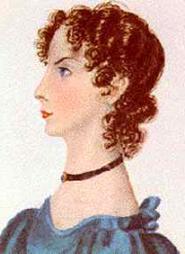
On Wednesday I wrote about Mary Ward’s introduction to The Tenant of Wildfell Hall by Anne Brontë. And the more I think about it, the more I realize it wasn’t so much an introduction to the novel as it was a critique of Anne in comparison to her sisters. It does talk about the novel briefly, but mostly serves as a diatribe of the weakness of Anne’s literary contributions in comparison to Emily and Charlotte Brontë. IF you’re interested in reading What about Anne Brontë? Part 1, click here.
One of the great things about the Kindle version I am reading is that it is the second printing of The Tenant of Wildfell Hall and it contains a forward by the author. In the forward she, writing as Acton Bell, has quite a bit to say in response to her supporters and detractors. Something else to note is that at publication, aside from Jane Eyre, The Tenant of Wildfell Hall was the most successful of the Brontë’s novels. Without further ado let’s see what Anne has to say:
To represent a bad thing in its least offensive light is, doubtless, the most agreeable course for a writer of fiction to pursue; but is it the most honest, or the safest? Is it better to reveal the snares and pitfalls of life to the young and thoughtless traveller, or to cover them with branches and flowers? Oh, reader! if there were less of this delicate concealment of facts—this whispering, ‘Peace, peace,’ when there is no peace, there would be less of sin and misery to the young of both sexes who are left to wring their bitter knowledge from experience.


 A love story to make you smile. I thoroughly enjoyed reading Agnes Grey and although it was somewhat predictable, I felt it was well written and worthy of its place in the Brontë compendium. (Not the right word, someone help me!)
A love story to make you smile. I thoroughly enjoyed reading Agnes Grey and although it was somewhat predictable, I felt it was well written and worthy of its place in the Brontë compendium. (Not the right word, someone help me!) I purchased this novel back in September at the Border’s
I purchased this novel back in September at the Border’s  “Sex everywhere: it was slopping over, a neap tide that swept the props from under the city.” (204)
“Sex everywhere: it was slopping over, a neap tide that swept the props from under the city.” (204)